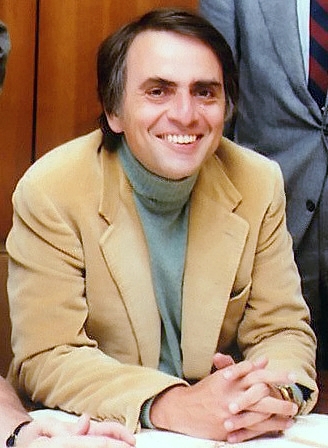Карл Саган знаменитые цитаты
Карл Саган Цитаты о мужчинах
„Книги — это доказательство того, что люди способны творить магию.“
Книги разбивают кандалы времени, доказывая, что люди способны на волшебство.
«Мир, полный демонов: Наука - как свеча во тьме»
Источник: Ричард Докинз, «Бог как иллюзия» — гл. 10.
«Мир, полный демонов: Наука — как свеча во тьме»
«Мир, полный демонов: Наука — как свеча во тьме»
„Как может человек представить себе мышление существа куда более разумного, чем он сам?“
мышление
Источник: Контакт
Карл Саган Цитаты о мире
демон
Источник: Мир, полный демонов. Наука - как свеча во тьме
мир
Источник: Мир, полный демонов. Наука - как свеча во тьме
Карл Саган цитаты
Карл Саган. Космос, 1980
„Перед лицом Космоса большинство людских дел выглядят незначительными, даже пустячными.“
Карл Саган. Космос, 1980
дух
Источник: Мир, полный демонов. Наука - как свеча во тьме
демон
Источник: «Мир, полный демонов: Наука - как свеча во тьме»
природа
Источник: Человек и его символы
„Это так просто - отключить собственный ум и твердить: все сотворил Господь.“
ум
Источник: Контакт
„С точки зрения религии люди — это дети, которых необходимо припугнуть, чтобы они хорошо себя вели.“
религия
Источник: Контакт
«Мир, полный демонов: Наука — как свеча во тьме»
Мир, полный демонов: Наука — как свеча во тьме, 1997
„Книга оказалась лучше кино. Просто потому, что в ней содержалось много больше.“
книга
Источник: Контакт
Карл Саган: Цитаты на английском языке
Источник: The Demon-Haunted World : Science as a Candle in the Dark (1995), Ch. 1 : The Most Precious Thing, p. 12
Источник: The Demon-Haunted World: Science as a Candle in the Dark
“Science is, at least in part, informed worship.”
Источник: The Varieties of Scientific Experience: A Personal View of the Search for God (2006)
“I've always thought an agnostic is an atheist without the courage of his convictions.”
Источник: Contact
“Those at too great a distance may, I am well aware, mistake ignorance for perspective.”
Introduction (p. 7)
The Dragons of Eden (1977)
Источник: Dragons of Eden: Speculations on the Evolution of Human Intelligence
Источник: The Varieties of Scientific Experience: A Personal View of the Search for God
Источник: The Varieties of Scientific Experience: A Personal View of the Search for God
“And you are made of a hundred trillion cells. We are, each of us, a multitude.”
Источник: Cosmos
“Not explaining science seems to me perverse. When you're in love, you want to tell the world.”
"With Science on Our Side" https://www.washingtonpost.com/archive/entertainment/books/1994/01/09/with-science-on-our-side/9e5d2141-9d53-4b4b-aa0f-7a6a0faff845/, Washington Post (January 9, 1994)
Вариант: Not explaining science seems to me perverse. When you're in love, you want to tell the world.
Источник: The Demon-Haunted World: Science as a Candle in the Dark
17 min 40 sec
Источник: Cosmos: A Personal Voyage (1990 Update), Who Speaks for Earth? [Episode 13]
Carl Sagan, author interview
PT Staff
Psychology Today
1996
January
01
http://www.psychologytoday.com/articles/199601/carl-sagan?page=3
Источник: Pale Blue Dot: A Vision of the Human Future in Space (1994), p. 398
Источник: The Demon-Haunted World: Science as a Candle in the Dark
Источник: The Demon-Haunted World: Science as a Candle in the Dark
Источник: Pale Blue Dot: A Vision of the Human Future in Space (1994), p. 53
Контексте: Once we overcome our fear of being tiny, we find ourselves on the threshold of a vast and awesome Universe that utterly dwarfs — in time, in space, and in potential — the tidy anthropocentric proscenium of our ancestors. We gaze across billions of light-years of space to view the Universe shortly after the Big Bang, and plumb the fine structure of matter. We peer down into the core of our planet, and the blazing interior of our star. We read the genetic language in which is written the diverse skills and propensities of every being on Earth. We uncover hidden chapters in the record of our origins, and with some anguish better understand our nature and prospects. We invent and refine agriculture, without which almost all of us would starve to death. We create medicines and vaccines that save the lives of billions. We communicate at the speed of light, and whip around the Earth in an hour and a half. We have sent dozens of ships to more than seventy worlds, and four spacecraft to the stars. We are right to rejoice in our accomplishments, to be proud that our species has been able to see so far, and to judge our merit in part by the very science that has so deflated our pretensions.
